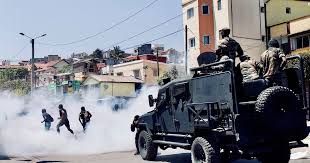
Malagasy President Andry Rajoelina has dissolved his entire government, including Prime Minister Christian Ntsay, following a wave of violent protests that have left at least 22 people dead, according to the Office of the United Nations High Commissioner for Human Rights (OHCHR).
The government disputes this figure.
The demonstrations, which began on September 25, have swept through the capital, Antananarivo, and cities including Antsirabé and Toamasina, driven by recurring water and power outages that have disrupted daily life.
While initial reports cited six fatalities, the UN now records at least 22 deaths and over 100 injuries. According to OHCHR, some victims were shot by security forces, while others died during looting and clashes at the edges of the protests.
Outgoing ministers will continue managing day-to-day affairs until a new government is formed.
President Rajoelina’s decision comes amid mounting public frustration, amplified through social media and the “Leo Délestage” movement, representing a mobilized youth demanding solutions to persistent energy and water shortages.
Volker Türk, UN High Commissioner for Human Rights, condemned what he described as a “violent and unnecessary response” by the security forces.
The unrest has also prompted authorities to impose a nighttime curfew to contain further violence.
Regional and international actors have called for restraint.
The Southern African Development Community (SADC) expressed “deep concern” and reaffirmed support for the Malagasy government and people in restoring “peace and stability” while safeguarding “the security, dignity, and well-being of all citizens.”
Mahmoud Ali Youssouf, Chairperson of the African Union Commission, echoed the call for dialogue, urging a collaborative effort between Madagascar, SADC, and the AU to ease tensions and seek lasting solutions.
Despite the government’s dissolution and emergency measures, the situation remains tense. The crisis underscores Madagascar’s chronic structural challenges, with a fragile governance framework struggling to manage one of the world’s poorest countries’ ongoing energy and water crises.



